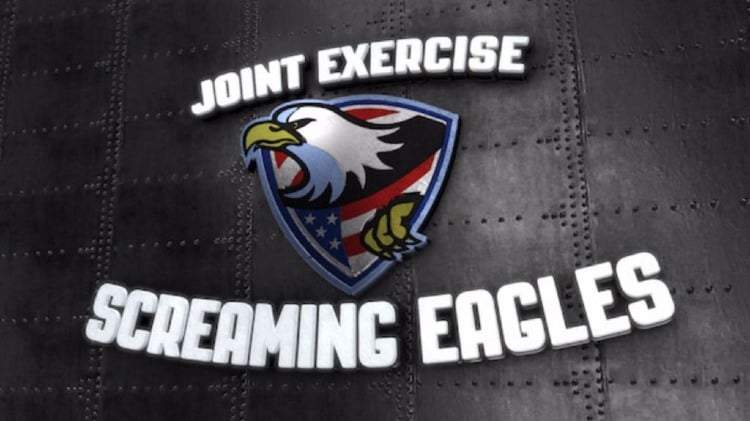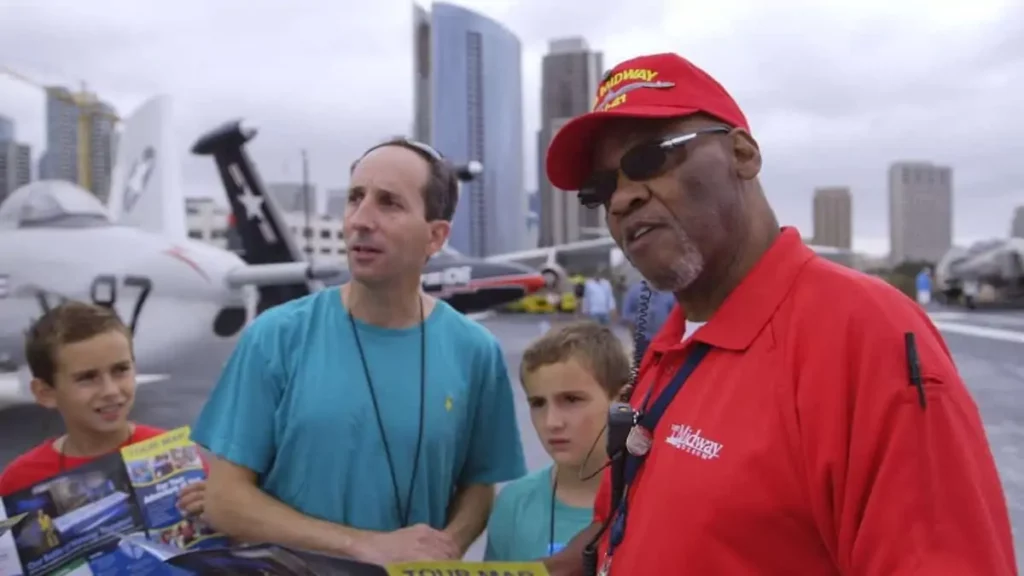
The aircraft carrier USS Midway was commissioned into the United States Navy just weeks after World War II and, till 1955, was the largest ship in the World.
After serving in the US Navy for 47 years, it was decommissioned in 1992.
In 2004, the ship was reborn in San Diego as the USS Midway Museum and, till now, has attracted more than 15 million visitors.
This article shares what visitors can expect inside the USS Midway Museum.
Top Ticket
Book your USS Midway tickets early and guarantee your spot on this unforgettable experience.
What’s ahead
Self-guided tour
Entry tickets to the USS Midway Aircraft Carrier include a self-guided audio tour.
Tourists who have tried the audio tour highly recommend it. They say it brings Midway’s history to life and adds a personal touch to the experience.
There are two audio tours: one for adults and one for children.
The self-guided audio tours are available in English, Spanish, Japanese, Chinese, German, and French.
Buy USS Midway TicketWhat to see at USS Midway
The USS Midway Museum spans 10 acres of exhibits and displays, featuring 30 restored aircraft.
From high up on the ship’s bridge to the main engine room below, visitors see more than 60 exhibit areas painstakingly restored to their glory days.
We list the must-see attractions at this No. 1 tourist spot in San Diego.
Hanger Deck Exhibits
The Hangar Deck of the aircraft carrier USS Midway is massive.
In this section, you learn about the Midway War, see vintage aircraft from World War II, and climb into actual aircraft cockpit trainers.
Some of the highlights are –
Battle of Midway Exhibit
Visitors can see and interpret interactive displays on the Battle of Midway, including the restored F4F Wildcat fighter and SBD Dauntless dive bomber aircraft.

This section provides an excellent overview of the war, further complemented by the 15-minute movie you will watch later in the tour.
Operation Frequent Wind display
This exhibit is dedicated to USS Midway’s role in saving the refugees of Saigon in 1975.
Don’t miss out on Bird Dog light plane, which made a desperate landing on the Midway’s Flight Deck and, in the process, saved an entire family from Saigon.
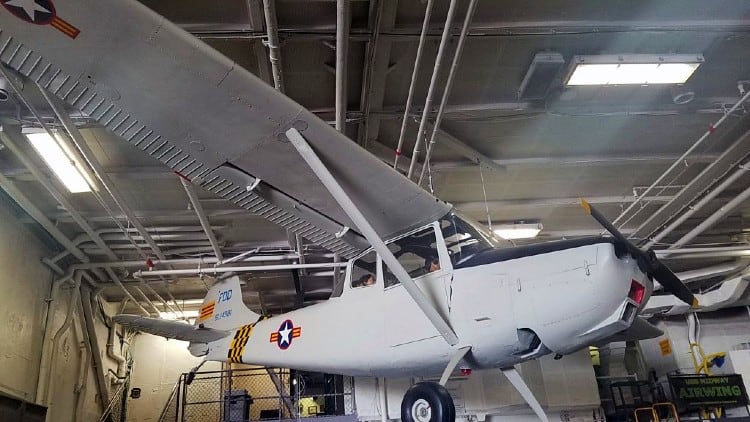
R-2800 Twin Wasp engine
The R-2800 Twin Wasp engine played a crucial role in the victory at Midway.

The exhibit allows viewers to explore the intricate inner workings of a World War II-era engine.
Its components interact to produce the horsepower required for powerful aircraft such as the F4U Corsair.
WW II aircraft
USS Midway had missed World War II by weeks, but that didn’t stop the massive ship from deploying wartime aircraft designs in her early days.
In this section, visitors can view vintage aircraft, including the F4U Corsair, TBM Avenger, and SNJ Texan utility plane.

Sailor’s sleeping quarters
In here, you see the harsh conditions in which the ship’s crew slept.
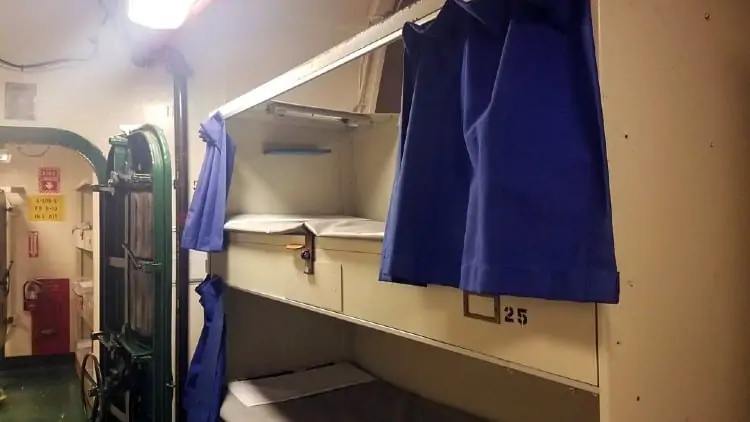
You can also lie down in one of the bunks to see what sleeping under the Midway’s busy Flight Deck was like.
Gallery Deck exhibits
This area was the home of the Air Wing of the Aircraft Carrier.
You get to see the Squadron Ready Rooms, understand the story of naval helicopters, and learn how the pilots and their support staff lived just below the flight deck.
Anchor Chain Room
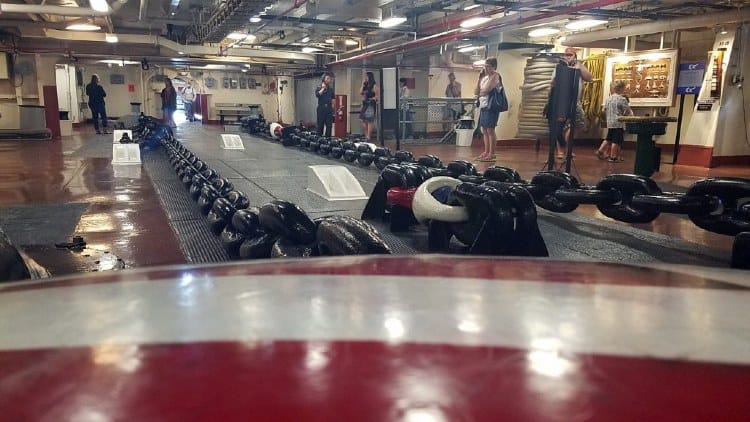
Also known as the fo’c’sle of the ship, this is where you get to see the massive anchor chains.
Here, you can also learn and practice the numerous knots seamen have used over the centuries.
Command Information Center
The Command Information Center (CIC) is the room on a warship where the Captain receives and processes information for command and control of the ship and its operations.
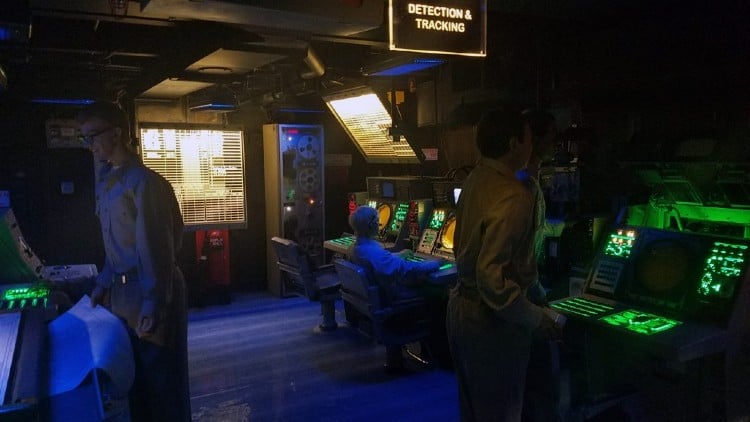
This can also include information about a raging battle just above.
You can stand in the middle of the CIC and feel like a Captain.
Carrier Air Group (CAG)
Here, visitors get to see and understand the everyday operations of the Midway Air Wing.
Helicopter History Exhibit
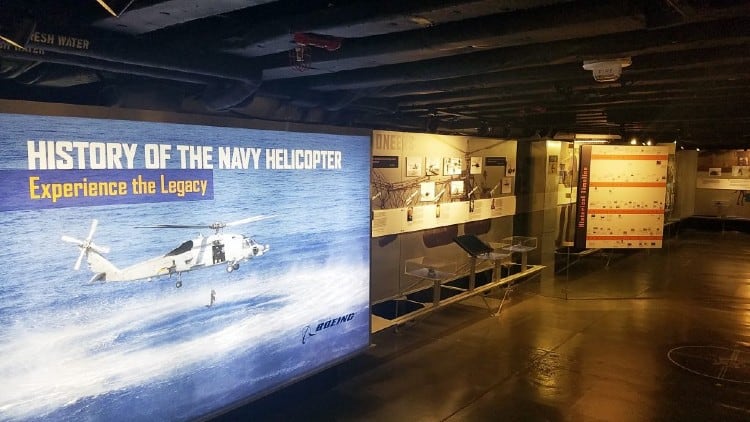
In this museum section, you can explore the history of helicopters and their significance to naval aviation, then and now.
Flight Deck Exhibits
In this section, visitors see and touch the fighters, bombers, and helicopters that made USS Midway a potent aircraft carrier.
They also learn to take off and land on such a small airstrip.
Midway Airwing
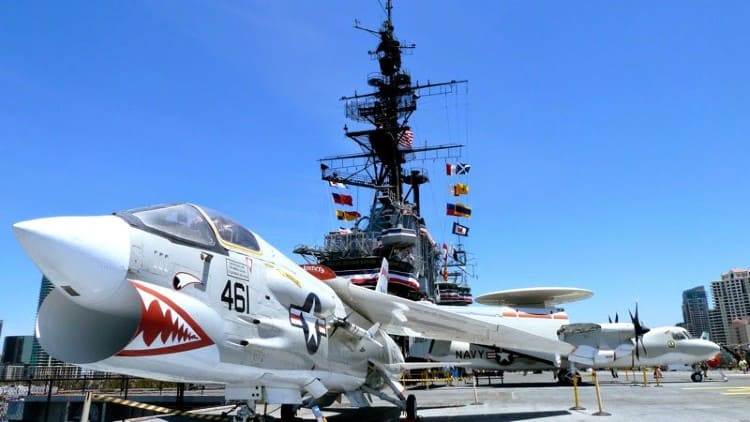
On the Midway’s Flight Deck, one can see 26 restored carrier aircraft, including jet fighters, helicopters, attack aircraft, and specialized designs.
Meatball Exhibit
Don’t miss the restored Fresnel Lens Optical Landing System (OLS)
Nicknamed ‘meatball,’ it was used to give path information to pilots in the last phase of the aircraft’s landing on the carrier.
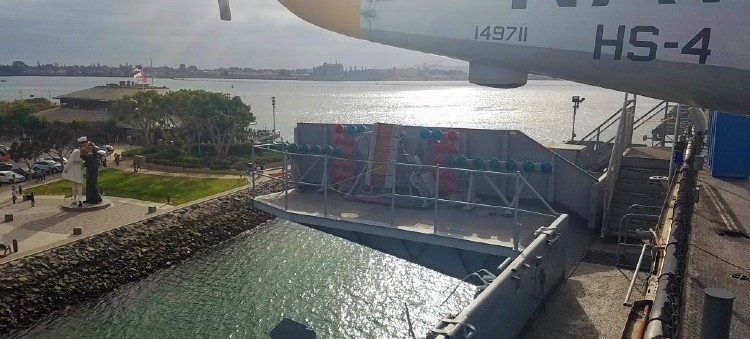
An interactive display explains how this special light rig helps the pilots.
Pilot Ready Rooms
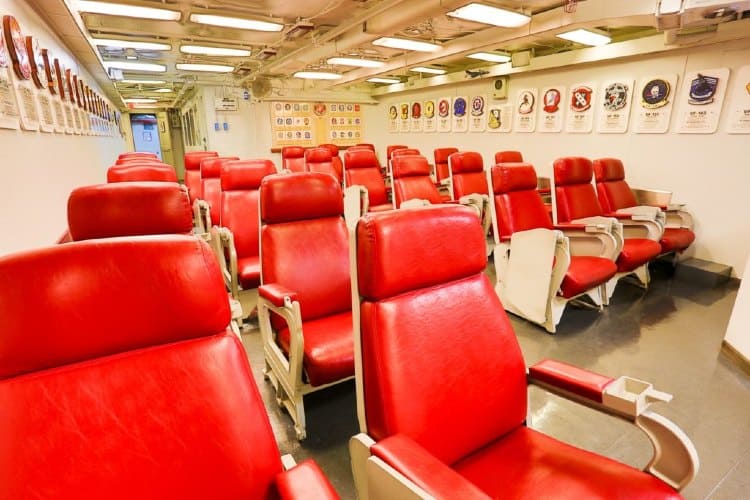
These were the rooms the pilots used to prepare physically and mentally before taking off.
Dedicated volunteer organizations sponsor and exhibit each of the seven Midway’s pilot-ready rooms.
Ship’s Bridge
The Ship’s Bridge is where the Captain steers the ship and oversees flight operations.
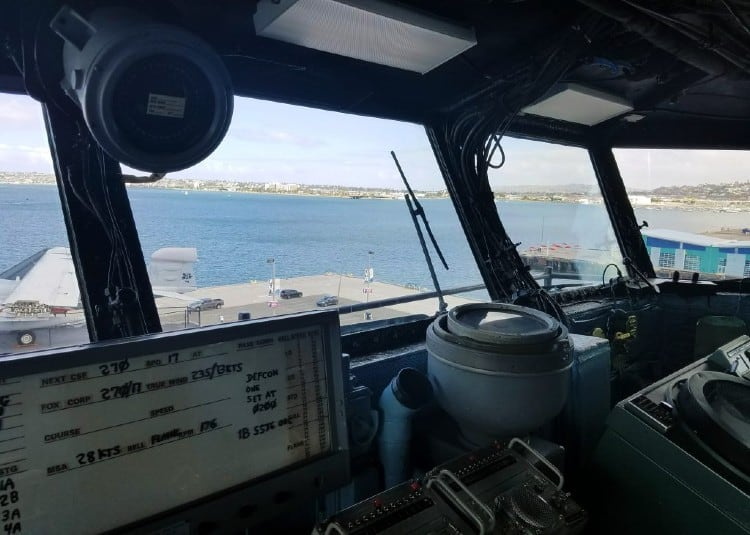
Don’t miss out on all the equipment you will see on the ship’s bridge.
The Captain’s area

You see where the Admiral lived below the Flight Deck and the command center from where he participated in Operation Desert Storm.
Don’t miss out on the Radio message center and the Midway Captain’s cabin, where he entertained dignitaries.
Below Deck exhibits
This section is the less romantic and yet an essential part of the aircraft carrier, for it keeps it going.
Here, you can climb into the narrow sleeping bunks of the young sailors, see how their meals were prepared (14,000 meals a day!), see their hospital ward, and go down even further to marvel at the massive engine room.
Chow Line
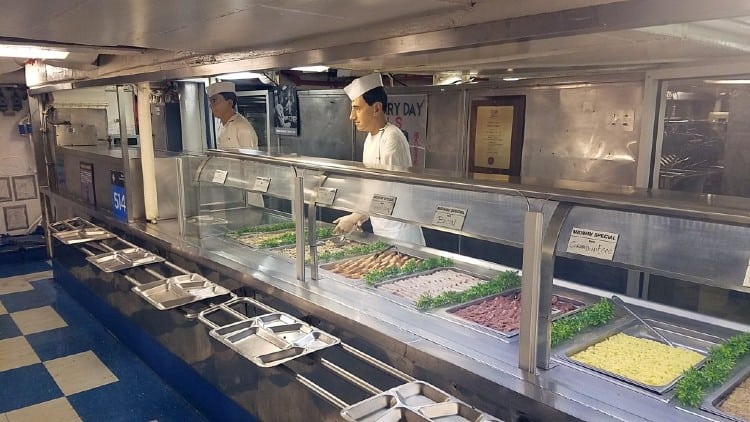
At the Chow Line and Galley display below decks, one can see and understand how the food was cooked for the 4,500 crew members of the USS Midway.
It was as if a small city was being fed daily.
Midway Chapel

Midway’s Chapel addressed the spiritual needs of the many faiths represented by Midway’s crew.
The Chapel was built with the space restrictions on the ship kept in mind.
Today, it is completely restored and features four rows of seats.
Wardroom
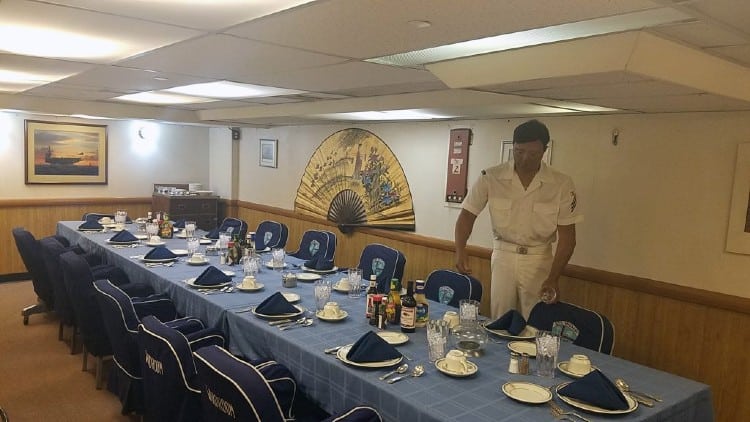
The Midway’s officers dined separately from the rest of the seamen.
While the seamen stood at the Chow Line, the officers socialized in the Wardroom.
Don’t miss out on the unique silver service set on display and the informal “Dirty Shirt” Wardroom frequented by the pilots.
Sick Bay
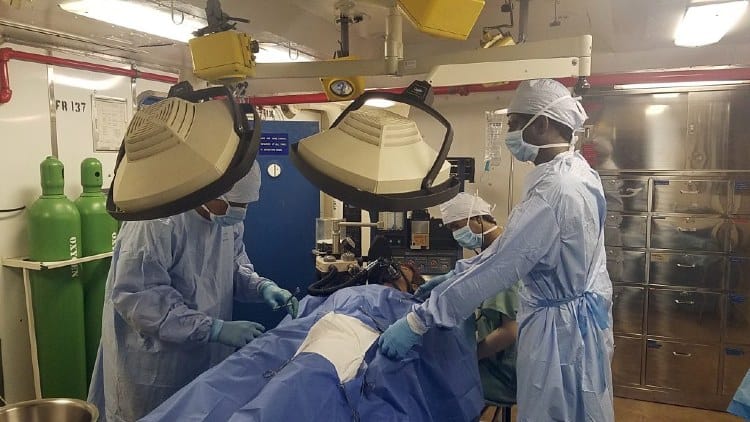
The Sick Bay exhibit demonstrates how the medical team addressed the health needs of Midway’s crew.
Here, doctors could perform a routine dental checkup or a complicated surgery.
Engine Room & engineering
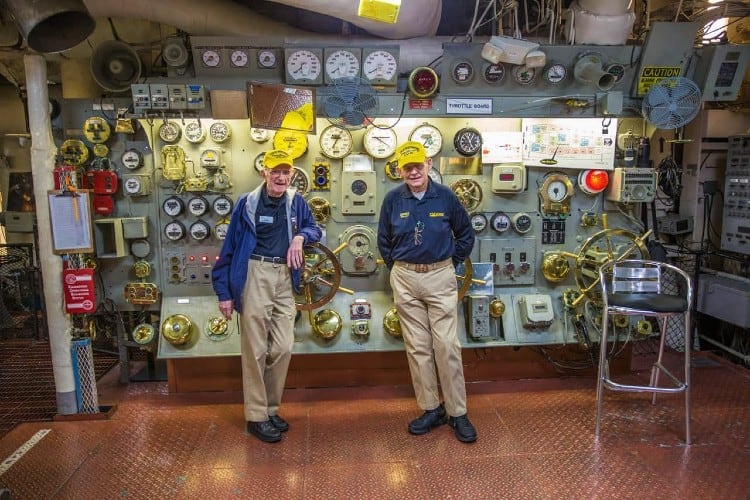
You go below the water line to check out the restored Engine Room and Main Engine Control.
The work conditions inside the steam engine room powering an aircraft carrier were extraordinary, and you get to see it first hand.
Buy USS Midway TicketActivities at USS Midway
Besides the 60-plus exhibits, you can also indulge in exciting activities while visiting the USS Midway Museum in San Diego.
We list seven of our favorite USS Midway experiences.
Battle of Midway Theatre
Midway’s 90-seat theater presents an exciting multimedia movie about the Battle of Midway, titled ‘Voices of Midway.’
The 15-minute movie narrates one of the most pivotal naval battles of World War II through the eyes and voices of the seamen who participated.
The ‘Voices of Midway’ is located at the Battle of Midway Exhibit and plays out at 25-minute intervals throughout the day.
This inspirational activity is part of the USS Midway entry ticket.
Flight Simulators
These flight simulators are your chance to live the life of an aviator onboard the USS Midway.
Air Combat 360
This is a two-player simulator that puts you in the pilot’s seat for a pulse-pounding aerial combat ride, where you control all the action.
Air Combat 360 pilots can roll, somersault, spin, and loop in a single session.
This simulator experience is not part of the regular admission ticket.
No reservation is required; visitors can try them out on a first-come, first-served basis.
However, it costs $8 per person.
Height restrictions: Riders must be at least 42″ tall to ride with an adult. Must be at least 48″ tall to ride without an adult. The maximum height to ride is 77 inches (6’5″).
Screaming Eagles
The Screaming Eagles simulator is the perfect way to get under the skin of an F/18 pilot.
If you have nerves of steel, you can join the men and women in the Training Exercise ‘Screaming Eagles.’
The objective is to launch your F/18 off the aircraft carrier, hit the targets provided, finish your air-to-air mission, and safely land on the USS Midway.
Of course, new challenges can crop up from anywhere in the sky.
This simulator experience is not part of the regular admission ticket and costs $7 per rider.
No reservation is needed, and visitors line up to try them.
Height restrictions: Riders must be at least 38 inches tall to ride.
Guided Island Tour

An aircraft carrier’s island serves as the command center for flight deck operations and is situated on the flight deck.
This tour is part of the regular USS Midway ticket, and a world-class volunteer Docent acts as your guide and takes you up serpentine ladders through the ship’s navigation and flight control sections.
The guide then explains air operations, the pilot’s flight deck, navigational chart room, the captain’s bridge, and the captain’s at-sea cabin.
Due to limited space, this tour has a limited capacity, so we suggest lining up for it early in the day.
Junior Pilot Program
If you visit the Midway Museum with kids, the Junior Pilot Program is a must-attend activity.
To kick-start the program, please visit one of the Information Booths on board to obtain activity sheets for your child.
Then you follow Airman Sam Rodriguez as he takes you and the youngsters on an excellent and entertaining audio tour, which is also part of the regular Midway Museum ticket, to more than 30 locations on the ship.
Once the kids complete Sam’s tasks, they will be treated to a ceremony performed by one of Midway’s volunteer Docents, where they will earn their Junior Pilot Wings.
Catapult and Trap Talks
The Catapult and Trap talks are an excellent opportunity to learn how aircraft land and take off from carrier decks.
Expert volunteer Docents explain the complicated process of taking off (catapult) and landing (trap) on an aircraft carrier’s short flight deck.
Many of these volunteers are former Navy pilots themselves.
These Catapult and Trap Talks are given daily on the flight deck during regular museum hours, and you can join for free.


